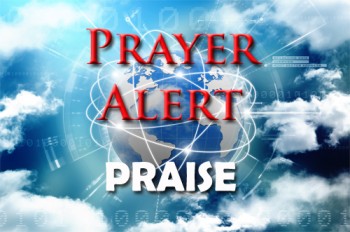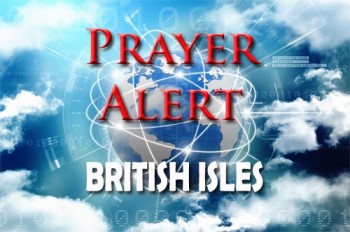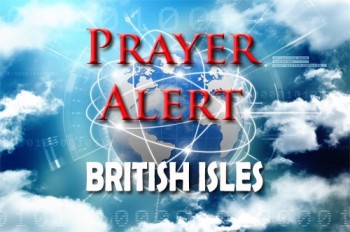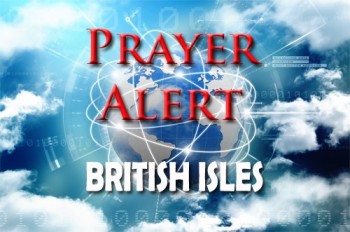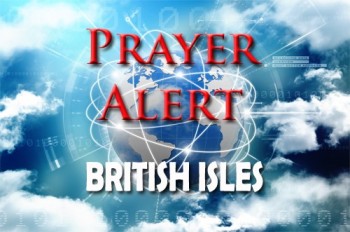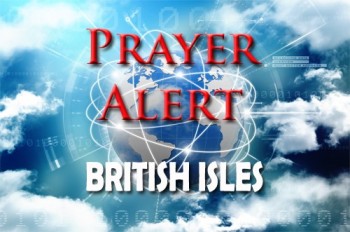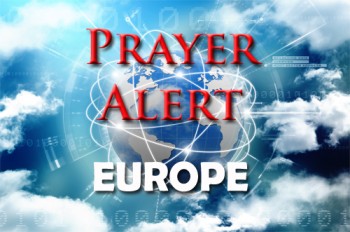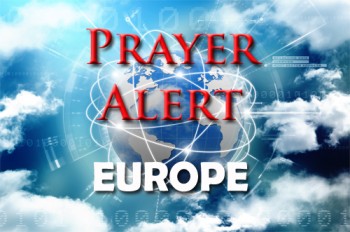
David Fletcher
David Fletcher is Prayer Alert’s Editor.
He is part of a voluntary team who research, proof-read and publish Prayer Alert each week.
If you would like to make a donation towards our running costs, please click here.
Fred’s body was engulfed in a flame in a tragic accident. He rolled on the ground, but there was extensive damage to his arms and legs. He was airlifted to a burn centre in a critical condition. Julie, his wife, prayed. ‘I knew God was there: I just prayed the whole time that he’d be okay.’ Doctors were amazed that Fred’s lungs and airways were undamaged by the fireball. After only two days in ICU, his circulation was remarkably better - but then infection set in and his condition deteriorated. Julie redoubled her prayers, requesting intercession from family and church. They also prayed with him before his surgery. Doctors said he might be unable to work for six months. But God heard their prayers! Ten days after his last skin graft, Fred was released from hospital, and returned to work a month later.
The media is predicting a bitter Christmas election battle. Politics may dominate the headlines, but we must not forget other vital concerns. A general election provides opportunities for Christians to speak out and play their part in voting. Believers have to make a judgment about how their vote can be used to best effect. A new Parliament could vote on laws liberalising divorce, abortion and drugs; laws affecting religious liberty, freedom of speech, transgender rights and teaching on marriage, sex and relationships in schools. These are all issues of concern to Christians. It is unlikely that we will find a party or a candidate we believe has all the right views. For many Christians, there is a genuine dilemma over choosing a party or a candidate. We can weigh the evidence before the Lord, and allow Him to exercise our conscience. See also praise article 1.
1,800+ refugee children have safely and legally entered the UK from Greece, Italy and Spain through routes that ‘Safe Passage’ has opened for them. Working in Northern France, it is asking the home secretary to ensure that unaccompanied child refugees are not Brexit victims. As the UK’s EU exit is debated, little thought has been given to unaccompanied refugee children hoping to join their families in the UK. A no-deal Brexit, or a Brexit that does not consider their situation, means that under current EU law children could no longer access a safe and legal route. They might have to risk their lives in the hands of smugglers and traffickers. The only way to guarantee that Brexit does not leave them separated from their loved ones is for the Government to commit to maintaining the current family reunion safe passage arrangements from day one if the UK exits the EU.
We know that Jesus came to transform our brokenness, and, as His representatives on earth, we carry His mandate. But how do we address the huge issue of mental health? Emerge Advocacy has been taking on the challenge. Launched in Guildford in 2016, Emerge is a ‘voice of hope’ to young people who find themselves overwhelmed by their thoughts and feelings and unable to keep themselves safe. Teams in A&E departments bringing comfort, hope and peace to young people admitted after self-harming or a suicide attempt. They have already supported over 350 young people, and their work is recognised by the Care Quality Commission. Young people struggling to articulate thoughts and feelings to health professionals may feel intimidated by the clinical environment. Volunteers stay with them, reassuring them, chatting, explaining what is happening, and helping them engage with health professionals, so that the experience is not so overwhelming.
Lord Carey has launched a judicial review against the Home Office, claiming it has discriminated against Christian Syrian refugees. He writes, ‘War in Syria has reignited. Once again refugees fill its roads in need of our compassion. Yet those from the “wrong faith” won’t find it from the British government. The UK’s resettlement of 16,000 refugees from the earlier conflict saw hardly any from the most brutalised minorities reach safety in our land. Of the refugees who came here in 2015 under the Vulnerable Persons Scheme, only 1.6% were Christians - despite being 10% of the Syrian population. The situation for Christians seeking asylum has worsened. In 2016 only 0.4% were Christians; in 2017, 0.2%. In the early part of last year none of the 1,112 refugees we took in were Christians.’
A cross-party group (https://www.theguardian.com/society/2019/oct/30/assisted-dying-laws-are-in-need-of-review) of 20+ MPs want the law banning euthanasia to be reviewed. The current law punishes assisted suicide with up to fourteen years’ imprisonment. However, committing the offence may not automatically result in prosecution. Consideration must be made whether a prosecution is in the public interest. There is a lobby of campaigners and individuals who are determined to see some form of assisted suicide introduced in the UK. - Dignity in Dying. Nearly all pain can be alleviated to some degree through medicine and palliative care. When patients’ physical, social, psychological and spiritual needs are properly met, suicide requests are extremely rare. The UK is a world leader in the provision of palliative care, and we should build on this legacy. If we permit assisted suicide, the right to die will soon become a duty to die for some of the most vulnerable in our society.
A ‘safer custody’ telephone line for families to flag up concerns about a prisoner's physical or mental health was a key recommendation in a review commissioned by the Government, but research shows hotlines were not answered or had not been set up in over one third of jails. Most emergency calls went to an answering machine. Figures for the twelve months to June 2019 revealed 86 self-inflicted deaths, up from 81 in 2018, and 57,968 incidents of self-harm, an increase of 24% on the previous year. Peter Dawson, director of the Prison Reform Trust (PRT), said the problem is a very long way from being solved. It demands action now, as lives depend on it. The PRT said poor arrangements for families to get in touch with prisons had been identified in inquests into the deaths of prisoners.
A survey of 1,400 women with Down’s syndrome babies found that 69% were offered a termination. Nearly half who wanted to continue with the pregnancy were asked again. 91% were offered further tests after discovering a high chance of Down's. Of those who declined further tests, 44% were pressurised regardless. One mother said that, even though they made it clear that wasn't an option for them, professionals pushed them about fifteen times to terminate. ‘At 38 weeks they said if I changed my mind on the morning of the induction to let them know, because it wasn't too late; until the baby had started travelling down the birth canal, I could still terminate.’ Millions of pounds are poured into refining the Down’s screening process, whilst £5.33 per person per year is spent on research to improve the lives of people with Down's syndrome.
Frédéric Fornos, director of the Pope's worldwide prayer network, has said that the eRosary combines the best of Church tradition with the best of technology. The device is aimed at young people who seek to learn how to pray and who don't really know how to. It reminds them to pray three times a day. Once connected to its application, the Rosary has specific content, such as thematic prayers, allowing fervent users to record and share their spiritual activity. One researcher said a security flaw in the application allows an attacker to take over the account of the victim and get the victim's personal information just by knowing their email address. Another problem is the price of the device, which many consider to be too high.
Religion is again at the forefront of French public debate. After an 84-year-old former far-right candidate fired shots at a mosque in Bayonne, Emmanuel Macron evoked the French concept of ‘laïcité’ in a speech at the inauguration of a European Centre for Judaism. Defined as the concept of separation of church and state, it has also been at the centre of debates about wearing religious symbols in public. Macron said, ‘Laïcité is a tenet of fraternity that should live in each French person like a compass in their relationship to other citizens - that is essentially a form of French civility. I want to recall it at this moment in our nation's history, where these values of unity and cohesiveness are sometimes distorted and used by those who, seeking to sow hatred and division, use it to fight against this or that religion.’

